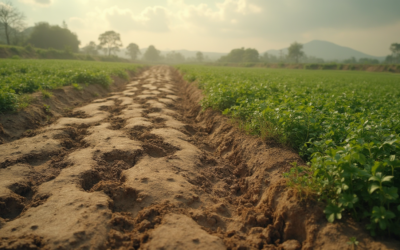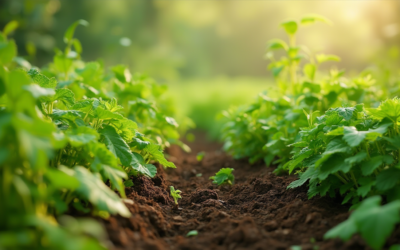Soil health and sustainable agriculture go hand in hand. As the cornerstone of food production, healthy soil ensures global food security while supporting climate resilience and biodiversity. Yet, over 50% of global soils are degraded, threatening agricultural productivity.
Table of Contents
Introduction
Healthy soil is the cornerstone of sustainable agriculture. It supports plant growth, ensures food security, and plays a vital role in regulating our climate. Yet, over 50% of global soils are degraded, jeopardizing agricultural productivity and the livelihoods of millions of farmers worldwide.
This post explores why soil health is fundamental to sustainable agriculture, the consequences of soil degradation, and practical solutions to restore and maintain healthy soils for future generations.
The Importance of Soil Health
Soil health refers to the ability of soil to sustain plants, animals, and humans by providing essential ecosystem services. Healthy soil:
- Boosts Agricultural Productivity: Nutrient-rich soils ensure higher crop yields and better-quality produce.
- Improves Water Retention: Soils rich in organic matter retain water better, reducing irrigation needs and improving drought resistance.
- Stores Carbon: Soil acts as a carbon sink, helping mitigate climate change by sequestering atmospheric carbon dioxide.
Without healthy soil, achieving sustainable agriculture and global food security is impossible.

The Impacts of Soil Degradation
Unsustainable farming practices, deforestation, and industrial activities have led to severe soil degradation. Key impacts include:
- Loss of Fertility: Overuse of chemical fertilizers depletes soil nutrients, making land unproductive.
- Increased Erosion: Poor land management results in topsoil erosion, removing the most fertile layer of soil.
- Declining Food Security: Degraded soils lead to lower agricultural productivity, putting global food supplies at risk.
Learn more about the long-term effects of soil degradation in our post on The Long-Term Effects of Chemical Fertilizers on Soil Health.

Solutions for Improving Soil Health
Restoring soil health requires adopting sustainable practices, including:
- Crop Rotation: Rotating crops reduces soil nutrient depletion and prevents pest infestations.
- Organic Farming: Using compost and natural fertilizers enriches the soil without harming its ecosystem.
- Cover Crops: Planting cover crops like clover or rye improves soil structure, enhances fertility, and prevents erosion.
For a deeper dive into regenerative farming techniques, check out our post on The Role of Cover Crops in Sustainable Agriculture.

Soil Health and Climate Resilience
Healthy soil is a key ally in the fight against climate change. It sequesters carbon dioxide, reduces greenhouse gas emissions, and mitigates the effects of extreme weather events such as droughts and floods. By investing in soil restoration, we can build resilient farming systems that thrive even in the face of climate challenges.
Bhumi’s Efforts to Support Healthy Soils
At Bhumi, we are committed to promoting sustainable soil management. Our initiatives include:
- Training farmers in regenerative agriculture techniques such as composting and crop diversification.
- Distributing organic fertilizers and soil testing kits to improve nutrient management.
- Advocating for policies that protect agricultural lands from degradation.
Together, we can restore soil health and secure a sustainable future for agriculture.
How You Can Contribute to Healthy Soils
Want to support healthy soils? Here’s how you can help:
- Purchase food from farmers who practice organic or regenerative agriculture.
- Compost at home to reduce waste and enrich your garden soil.
- Advocate for sustainable farming policies in your community.
Every small action contributes to a healthier planet.




